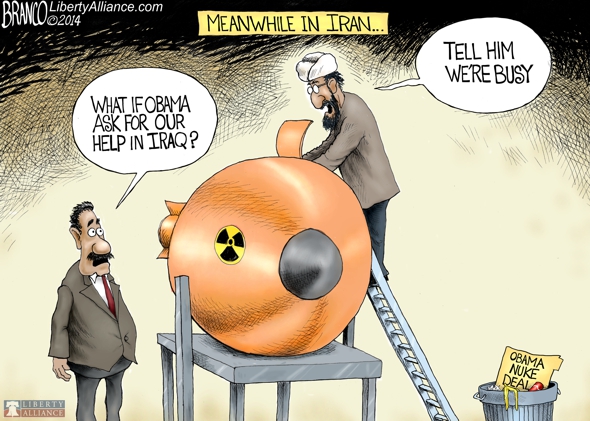IN THE MEDIA
Nuclear-armed Iran would pose a far bigger threat than Islamic State
October 2, 2014 | Colin Rubenstein

COLIN RUBENSTEIN
The Australian, October 02, 2014
THERE is no question that the Sunni radical group, the so-called Islamic State, is a serious threat – in terms of the global spread of Islamist extremism, in terms of promoting, planning, facilitating and inspiring international terrorism, and especially in terms of potentially destabilising many Middle Eastern states, including not only Iraq and Syria but also Jordan, Lebanon, Saudi Arabia and the Gulf states.
Yet while the ability of this well-funded and armed terrorist entity to capture territory protected by weak, ill-trained or hapless defenders is dangerous, most military analysts believe it would not be a match for organised and motivated regional armies.
By contrast, the Gulf region has a well-organised, well-resourced radical Islamist regime with hegemonic ambitions that commands a formidable army, has abundant funds, equips several proxy armies and terror groups abroad, and reportedly is also occupying and oppressing swaths of Iraq.
Most disturbingly, it has reached the advanced stages of developing a nuclear weapon and an intercontinental ballistic missile delivery system.
That nation is the Islamic Republic of Iran, and the long-term threat it poses to regional stability, global energy supplies and global non-proliferation efforts remains more disconcerting than the dangers posed by the Islamic State.
US and Australian efforts against the Islamic State seem fully justified by any serious consideration of both countries’ national interests. However, a significant concern is that the critical efforts to stop an Iranian bomb will be sidelined – or, worse still, Iran and its proxies will be empowered as a result.
Recent reports that Iranian officials are privately offering to co-operate in the fight against the Islamic State in return for concessions on their country’s nuclear program, while rebuffed by the US, underline this fear.
Talks between the P5+1 group of powers (comprising the permanent members of the UN Security Council plus Germany) and Iran continue to be unproductive ahead of a November 25 deadline, the latest round having occurred on September 19. There is reportedly little progress on the two key issues essential for any nuclear deal to be worth the paper it is printed on: greatly reducing the number of uranium-enriching centrifuges Tehran is permitted from its present stock of 20,000, and stopping construction of the Arak heavy-water nuclear reactor, which will produce easily weaponised plutonium.
Meanwhile, an International Atomic Energy Agency report early last month confirmed that Iran had failed to comply with a variety of transparency requirements imposed by last year’s interim nuclear agreement.
Further, Iran continues to fan the flames of the Israeli-Palestinian conflict, providing long-range rockets and rocket-production know-how to terrorists in Gaza, and recently promising to send similar weapons to the West Bank.
With the Islamic State and Gaza dominating the headlines, and the US understandably focused on building an international coalition to fight the Islamic State, it would be disastrous if, as a result, the main game were neglected. Nothing would be worse for regional or Western interests than allowing Iran to develop a fully fledged nuclear-weapons capability – through signing off on an inadequate nuclear deal or by allowing Iran to continue its bomb-building efforts without significant consequences.
While US President Barack Obama ostensibly has ruled out partnering with Iran to fight the Islamic State – which would alienate most of his Arab allies at least as much as Israel – it is clear that some in the administration see the Islamic State challenge as an area of common interest with Iran that could be the basis for a rapprochement. Thus, Iranian Supreme Leader Ayatollah Ali Khamenei recently claimed he had rejected US feelers, made via diplomats based in Iraq, to discuss co-operation or co-ordination against the Islamic State.
It’s not hard to understand the Obama administration’s probable rationale for these approaches; its main goal to date has been to withdraw US forces from the region and avoid direct conflict whenever possible.
Obama told The New Yorker in February that, to this end, he was seeking an “equilibrium between Sunni, or predominantly Sunni, Gulf states and Iran, in which there’s competition, perhaps suspicion, but not an active or proxy warfare”.
This approach may also partly explain the administration’s largely passive position on Syria until now – effectively giving Iran and its Hezbollah proxy carte blanche to preserve the Assad regime, a key part of Iran’s regional axis.
Some in the US administration appear to be still nurturing hopes that, by partnering with Iran in areas of mutual interest – such as the fight against the Islamic State – and taking account of Iran’s regional interests, the US will earn goodwill in Tehran, draw it into a regional security structure and persuade Iran to agree to an acceptable nuclear deal.
Similarly, last weekend, British Prime Minister David Cameron met Iranian President Hasan Rowhani at the UN, the first such face-to-face meeting since 1979’s Iranian revolution. Co-operation against the Islamic State was clearly on the table, with Cameron mentioning it in his post-meeting comments.
This risks a dangerously shortsighted and naive approach. The idea that the extremist Shia Islamist state of Iran – which has maintained a remarkably consistent policy for decades in terms of its state sponsorship of terror and other rogue behaviour – can be transformed into an ally or partner of the West may be superficially appealing but amounts to dangerous wishful thinking.
Yes, the Islamic State is certainly dangerous and must be “degraded and ultimately destroyed”, in Obama’s words. But nothing could damage long-term regional and wider global stability, and Australian and American interests in the region, more than to allow the fight against the Islamic State to become the distraction that allows Tehran to develop nuclear weapons capabilities or extend its regional sphere of influence.
Colin Rubenstein is executive director of the Australia/Israel & Jewish Affairs Council.
Tags: Iran





